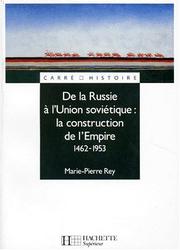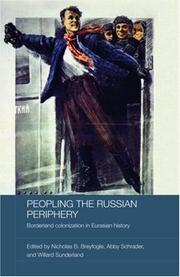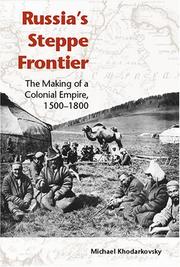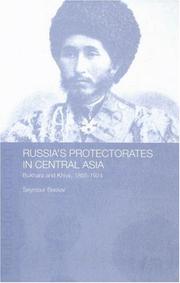| Listing 1 - 8 of 8 |
Sort by
|
Book
ISBN: 9780674916449 Year: 2021 Publisher: Cambridge, Mass. Harvard University Press
Abstract | Keywords | Export | Availability | Bookmark
 Loading...
Loading...Choose an application
- Reference Manager
- EndNote
- RefWorks (Direct export to RefWorks)
We Shall Be Masters is an illuminating account of Russia's attempts-and failures-to achieve great power status in Asia. Since Peter the Great, Russian leaders have been lured by opportunity to the East. Under the tsars, Russians colonized Alaska, California, and Hawaii. The Trans-Siberian Railway linked Moscow to Vladivostok. And Stalin looked to Asia as a sphere of influence, hospitable to the spread of Soviet Communism. In Asia and the Pacific lay territory, markets, security, and glory. But all these expansionist dreams amounted to little. Here, Chris Miller explores why, arguing that Russia's ambitions have repeatedly outstripped its capacity. With the core of the nation concentrated thousands of miles away in the European borderlands, Russia's would-be pioneers have always struggled to project power into Asia and to maintain public and elite interest in their far-flung pursuits.
History of Eastern Europe --- Russia --- RUSSIA--HISTORY --- RUSSIA--TERRITORIAL EXPANSION --- USSR--FOREIGN RELATIONS--ASIA
Book
ISBN: 9780465098491 Year: 2017 Publisher: New York : Basic Books,
Abstract | Keywords | Export | Availability | Bookmark
 Loading...
Loading...Choose an application
- Reference Manager
- EndNote
- RefWorks (Direct export to RefWorks)
In 2014, Russia annexed the Crimea and attempted to seize a portion of Ukraine. While the world watched in outrage, this blatant violation of national sovereignty was only the latest iteration of a centuries-long effort to expand Russian boundaries and create a pan-Russian nation. The author argues here that we can only understand the confluence of Russian imperialism and nationalism today by delving into the nation's history. Spanning over 500 years, from the end of the Mongol rule to the present day, the author shows how leaders from Ivan the Terrible to Joseph Stalin to Vladimir Putin exploited existing forms of identity, warfare, and territorial expansion to achieve imperial supremacy. An authoritative and masterful account of Russian nationalism, this book chronicles the story behind Russia's belligerent empire-building quest.
NATIONALISM--RUSSIA --- NATIONALISM--USSR --- RUSSIA--HISTORY --- RUSSIA--TERRITORIAL EXPANSION --- USSR--HISTORY --- USSR--TERRITORIAL EXPANSION --- UKRAINE--HISTORY --- BELARUS--HISTORY --- IMPERIALISM--HISTORY

ISBN: 2010173244 9782010173240 Year: 1994 Volume: 25 Publisher: Paris : Hachette,
Abstract | Keywords | Export | Availability | Bookmark
 Loading...
Loading...Choose an application
- Reference Manager
- EndNote
- RefWorks (Direct export to RefWorks)
947 --- Russia --- Soviet Union --- Foreign relations --- Territorial expansion --- History --- Russia - Foreign relations --- Russia - Territorial expansion - History --- Soviet Union - History - 1925-1953

ISBN: 0415418801 9780415418805 9780415544238 0203933761 9780203933763 9781134112838 9781134112876 9781134112883 0415544238 Year: 2007 Publisher: London ; New York : Routledge,
Abstract | Keywords | Export | Availability | Bookmark
 Loading...
Loading...Choose an application
- Reference Manager
- EndNote
- RefWorks (Direct export to RefWorks)
Russia --- Soviet Union --- Russie --- URSS --- Territorial expansion --- Emigration and immigration --- Expansion territoriale --- Emigration et immigration --- History. --- Territorial expansion. --- Emigration and immigration - Russia - History --- Emigration and immigration - Soviet Union - History --- Russia - Territorial expansion - History --- Russia - Emigration and immigration - History --- Soviet Union - Emigration and immigration - History --- Emigration and immigration.

ISBN: 9780253217707 0253217709 0253339898 9780253339898 Year: 2002 Publisher: Bloomington, Ind. : Indiana University Press,
Abstract | Keywords | Export | Availability | Bookmark
 Loading...
Loading...Choose an application
- Reference Manager
- EndNote
- RefWorks (Direct export to RefWorks)
"Drawing on sources and archival materials in Russian and Turkic languages, Russia's Steppe Frontier presents a complex picture of the encounter between indigenous peoples and the Russians. The book is a resource for understanding Russia's imperial experience."--Jacket
BOUNDARIES -- 930.3 --- Expansion territoriale --- Imperialism. --- Russia --- Territorial expansion. --- Boundaries. --- History --- Impérialisme --- Russie --- Boundaries --- Frontières --- Histoire --- Imperialism --- Territorial expansion --- Russia - Territorial expansion --- Russia - Boundaries --- Russia - History - Period of Consolidation, 1462-1605 --- Russia - History - 1613-1689 --- Russia - History - 1689-1801
Book
ISBN: 9782213638126 2213638128 Year: 2010 Publisher: Paris : Fayard,
Abstract | Keywords | Export | Availability | Bookmark
 Loading...
Loading...Choose an application
- Reference Manager
- EndNote
- RefWorks (Direct export to RefWorks)
"Si, à partir de Pierre le Grand, la Russie a tout fait pour s'arrimer à l'Occident, un voile recouvre l'autre versant de son identité : sa composante orientale. Au XIXe siècle, la construction d'un vaste empire colonial pousse la puissance russe toujours plus loin à l'est et au sud, du Caucase jusqu'à l'océan Pacifique. Entre la fondation de Saint-Pétersbourg en 1703 et la création de Vladivostok en 1860, on assiste à une véritable "orientalisation" de l'Empire. Militaires, savants et diplomates, écrivains et artistes nourrissent alors l'imaginaire de la Russie et fortifient sa vocation universelle. De Catherine II à Lénine, de Pouchkine à Diaghilev, cet ouvrage offre pour la première fois une présentation générale de la colonisation russe en Orient, des rêves - suivis parfois de réveils cruels - qui l'ont accompagnée, et dont certains durent encore"--P. [4] of cover.
Russia --- Asia --- Pacific Area --- Russie --- Asie --- Pacifique, Région du --- Territorial expansion. --- Relations --- Expansion territoriale --- Russie, --- URSS, --- --Relations extérieures --- --Asie --- --Orient --- --XVIIIe-XXe s., --- Soviet Union --- Territorial expansion --- Soviet Union. --- Pacifique, Région du --- Relations extérieures --- XVIIIe-XXe s., 1701-2000 --- Russie, -1922 --- URSS, 1922-1991 --- Orient --- Russia - Territorial expansion --- Russia - Relations - Asia --- Asia - Relations - Russia --- Soviet Union - Relations - Asia --- Asia - Relations - Soviet Union --- Russia - Relations - Pacific Area --- Pacific Area - Relations - Russia --- Soviet Union - Relations - Pacific Area --- Pacific Area - Relations - Soviet Union --- Identité collective --- Orientalisme --- Asie centrale --- 1800-.... --- Colonies
Book
ISBN: 9789633862858 9789633862865 9633862868 963386285X Year: 2019 Publisher: Budapest New York
Abstract | Keywords | Export | Availability | Bookmark
 Loading...
Loading...Choose an application
- Reference Manager
- EndNote
- RefWorks (Direct export to RefWorks)
This volume examines Russian discourses of regionalism as a source of identity construction practices for the country's political and intellectual establishment. The overall purpose of the monograph is to demonstrate that, contrary to some assumptions, the transition trajectory of post-Soviet Russia has not been towards a liberal democratic nation state that is set to emulate Western political and normative standards. Instead, its foreign policy discourses have been constructing Russia as a supranational community which transcends Russia's current legally established borders. The study undertakes a systematic and comprehensive survey of Russian official (authorities) and semi-official (establishment affiliated think tanks) discourse for a period of seven years between 2007 and 2013. This exercise demonstrates how Russia is being constructed as a supranational entity through its discourses of cultural and economic regionalism. These discourses associate closely with the political project of Eurasian economic integration and the “Russian world” and “Russian civilization” doctrines. Both ideologies, the geoeconomic and culturalist, have gained prominence in the post-Crimean environment. The analysis tracks down how these identitary concepts crystallized in Russia's foreign policies discourses beginning from Vladimir Putin's second term in power.
Geopolitics --- Regionalism --- Supranationalism --- Russia (Federation) --- Boundaries. --- Foreign relations. --- World politics --- Russian Federation --- Rossiyskaya Federatsiya --- Rossiya (Federation) --- Rossii︠a︡ (Federation) --- Российская Федерация --- Rossiĭskai︠a︡ Federat︠s︡ii︠a︡ --- Російська Федерація --- Rosiĭsʹka Federat︠s︡ii︠a︡ --- Federazione della Russia --- Russische Föderation --- RF --- Federation of Russia --- Urysye Federat︠s︡ie --- Правительство России --- Pravitelʹstvo Rossii --- Правительство Российской Федерации --- Pravitelʹstvo Rossiĭskoĭ Federat︠s︡ii --- Правительство РФ --- Pravitelʹstvo RF --- Rosja (Federation) --- O-lo-ssu (Federation) --- Roshia Renpō --- Federazione russa --- OKhU --- Orosyn Kholboony Uls --- Russian S.F.S.R. --- Foreign relations --- E-books --- Eluosi (Federation) --- 俄罗斯 (Federation) --- Foreign relations, Identity, Postcommunism, Regionalism, Russia, Territorial expansion, Ukraine. --- RF (Russian Federation) --- Россия (Federation)

ISBN: 1134335830 128017515X 0203390830 9780203390832 9780415328036 0415328039 9786610175154 6610175152 0415328039 9781134335831 9781134335787 9781134335824 9780415546188 1134335822 0415546184 Year: 2004 Volume: 5 Publisher: London New York RoutledgeCurzon
Abstract | Keywords | Export | Availability | Bookmark
 Loading...
Loading...Choose an application
- Reference Manager
- EndNote
- RefWorks (Direct export to RefWorks)
This book examines the Russian conquest of the ancient Central Asian khanates of Bukhara and Khiva in the 1860s and 1870s, and the relationship between Russia and the territories until their extinction as political entities in 1924. It shows how Russia's approach developed from one of non-intervention, with the primary aim of preventing British expansion from India into the region, to one of increasing intervention as trade and Russian settlement grew. It goes on to discuss the role of Bukhara and Khiva in the First World War and the Russian Revolution, and how the region was fundamentally cha
Bukhoro (Uzbekistan) --- Khiva (Uzbekistan) --- Russia --- Russie --- Rossīi︠a︡ --- Rossīĭskai︠a︡ Imperīi︠a︡ --- Russia (Provisional government, 1917) --- Russia (Vremennoe pravitelʹstvo, 1917) --- Russland --- Ṛusastan --- Russia (Tymchasovyĭ uri︠a︡d, 1917) --- Russian Empire --- Rosja --- Russian S.F.S.R. --- Russia (Territory under White armies, 1918-1920) --- Khiva (Uzbek S.S.R.) --- Khiva, Uzbek S.S.R. --- Bukhara (City) --- Bukhara (Uzbek S.S.R.) --- Bukhara (Uzbekistan) --- Bokhara (Uzbekistan) --- Boukhara (Uzbekistan) --- Bukharah (Uzbekistan) --- Politics and government. --- Territorial expansion. --- Bukhoro viloi︠a︡ti (Uzbekistan) --- Bukhoro wiloyati (Uzbekistan) --- Bukhara Province (Uzbekistan) --- Bukhoro Vilayet (Uzbekistan) --- Bukhara (Uzbekistan : Province) --- Bukhoro (Uzbekistan : Viloi︠a︡ti) --- Bukhoro (Uzbekistan : Wiloyati) --- Buxoro viloi︠a︡ti (Uzbekistan) --- Buxoro viloyati (Uzbekistan) --- Bukharskai︠a︡ oblastʹ (Uzbekistan) --- Politics and government --- Territorial expansion --- Bukhoro (Uzbekistan) - Politics and government --- Khiva (Uzbekistan) - Politics and government --- Russia - Territorial expansion --- Buxoro (Uzbekistan) --- Alt-Buchara (Uzbekistan) --- Staraya Bukhara (Uzbekistan)
| Listing 1 - 8 of 8 |
Sort by
|

 Search
Search Feedback
Feedback About UniCat
About UniCat  Help
Help News
News